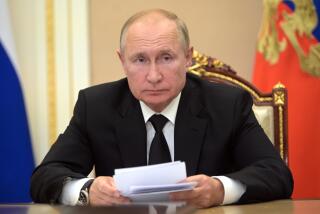Ford to Quit Soviet Venture in Car Making
- Share via
DETROIT — Ford Motor Co. said Thursday that it has pulled out of a project to produce cars in the Soviet Union after failing to win enough financial guarantees from the Soviet government.
Ford officials made the announcement just as six other American firms, members of the American Trade Consortium, signed an extensive trade agreement in Moscow with the Soviet government.
The six members are the giant food processor Archer Daniels Midland, Chevron, Eastman Kodak, Johnson & Johnson, RJR Nabisco, and Mercator Corp., a banking concern.
Two-Step Deal
The group has been negotiating for a year to complete the deal with the Soviet Foreign Economic Consortium and establishes a legal and business framework for the development of joint ventures. Details of the agreement were not revealed, but officials said feasibility studies will be conducted over the next year and the first joint ventures could start up within 18 months.
Ford had been the largest member of the consortium--with the most ambitious plans for doing business in the Soviet Union--before backing out of the group and dropping negotiations with the Soviet government’s automotive ministry.
Ford had been negotiating a massive, two-step deal to supply the Soviet elite with Western-quality luxury cars.
First, Ford would have exported its Scorpio performance luxury model from Ford’s West German operations to the Soviet Union, and later would have produced the Scorpio jointly with the Russians in the Soviet city of Gorky.
Ford planned to modernize an aging auto plant there that the original Henry Ford built for the Russians, while also adding new facilities on the same site.
But Ford officials said the company didn’t feel confident in the assurances the Russians had given them on the financial arrangements of the project. Ford spokesman Ken Brown said Ford didn’t believe that it had strong enough guarantees that it would always be able to obtain hard currency in exchange for its goods and services.
The ruble, the Soviet currency, has traditionally not been convertible to other currencies, and many Western firms have been forced to engage in complex barter deals in order to do business in Russia.
Brown said the trade consortium has won assurances that its members will be able to repatriate their profits, and will receive hard currency in exchange for their products. But Ford didn’t feel it had the kind of long-term guarantees it needed--that the current political and economic policies would remain in place in the future--in order to invest in such a large project.
Henry Kaska, a spokesman for Eastman Kodak, a leading member of the consortium, said the group was “disappointed” by Ford’s withdrawal. “But the consortium doesn’t depend on any one company,” he added. Kaska said other firms are now interested in joining the group.






